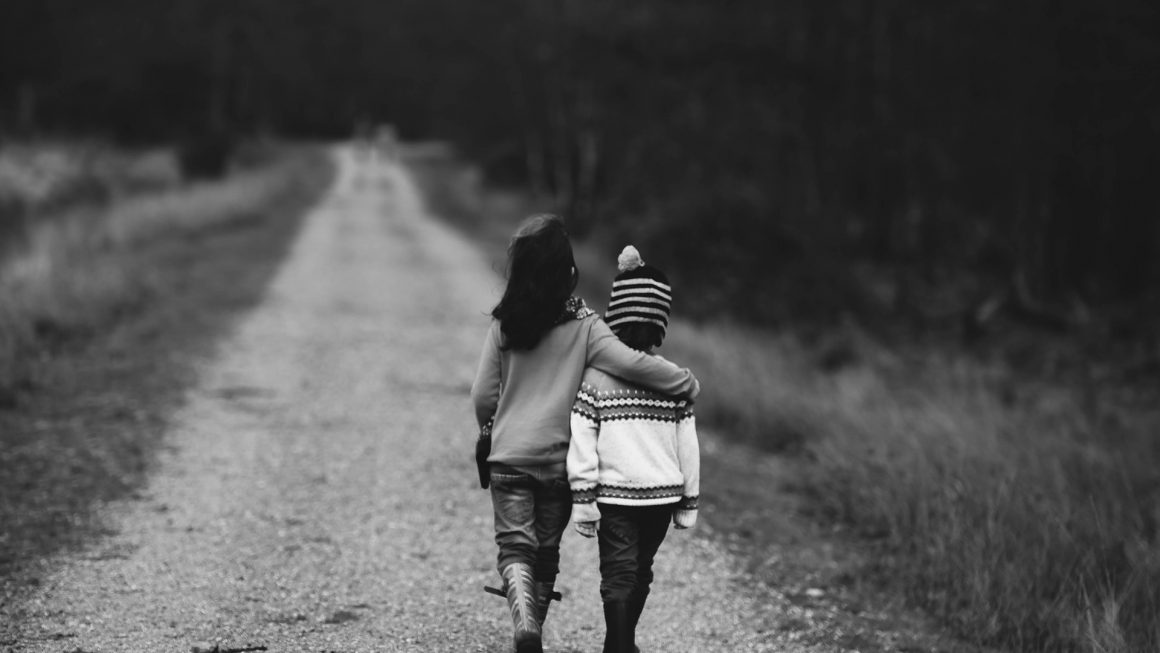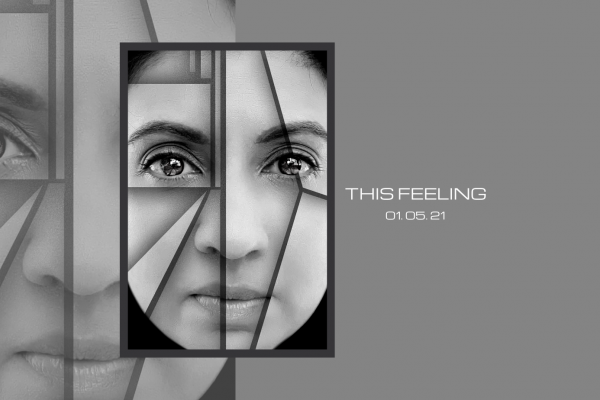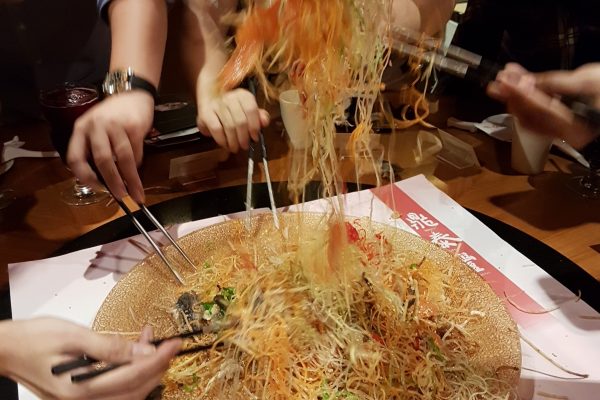I could never understand why I would often say I feel “guilty” when talking about my family situation. Well-meaning and practical people would respond by saying “you have done nothing wrong, you shouldn’t feel guilty.”
Which I consciously agree with. And yet, the feeling creeps in, now and then.
In my mind, there is an image of never-ending suffering when I think about my mom and brother.
I feel as though they lead such sad, hopeless lives because of my brother’s schizophrenia.
My mom, her life robbed by his illness, devoting every bit of her existence to him.
My brother, robbed of a life that could have been, having been diagnosed at a very young age.
I, on the other hand, have mostly been able to “get out” of that, leading my own life as well as I can. In fact, some envy what they “see” about my life – my career success, my wonderful husband, the amazing travels, my creativity and so on.
What they don’t see is the pain of being the sibling of a mentally ill person.
“How can I enjoy so much when all my poor brother can do is sit and stare at the walls?”
This feeling is so ridiculous that something as simple as reaching down to wash my feet when I am in the shower brings the guilt on.
Because my mom has told me that the psychiatric medications make my brother so stiff, he can’t bend down to wash his feet. And I feel sad (guilty?) that I can do it with ease.
Absolutely illogical.
So how do we explain the guilt that arises just by being the “sibling survivor”?
Sibling Survivor Guilt
As I researched siblings of a special needs / mentally ill child, the term Sibling Survivor Guilt kept coming up.
These are the 3 areas that resonated with me in understanding this guilt:
- Unconscious beliefs shaped during childhood
- Understanding the definition of survivor guilt
- Recognising childhood trauma for what it is
At the end of the day, realising that I wasn’t the only one with this strange, irrational feeling was reassuring. Having it validated has helped me better deal with the guilt.
1. Let’s talk about the unconscious forces driving guilt.
Several psychological theories are based on the belief that our patterns of thinking are shaped by our childhood experiences. We observe and we learn about the world around us through what we see.
But of course, as children, we do not have the mental development to fully comprehend the implications of what we see. Sometimes, we unconsciously start believing that we are responsible for the misfortunes of our parents / siblings.
Growing up, I was quite the happy child. From an extremely wealthy family, I had all the physical comforts and indulgences. I was obedient and hardworking, and had constant recognition for being smart, pretty, friendly and popular in school.
The exact opposite of my brother. I remember him being unfavourably compared with me, not just about academics but personality as well.
And as my brother started fading away into his illness, I remember being kept away (protected?) from it all. I don’t recall anyone ever explaining to me what was going on.
As he became more ill, I was only getting better and better at school. More and more positive reinforcements followed.
I might not have known it then, but the stage was being set for a future of irrational guilt.
The comparisons, the lack of open communication only serve to feed the guilt once the person is older and is able to see just how “unfair” the situation is.
Stupidly, in my head, my achievements are tied to his failures.
That “comparison” still goes on. Mind you, this isn’t what others are saying. The whole point about this article is the irrational feeling of guilt we siblings feel, which is all in our heads.
And this thinking is not unique to me. Reading other articles, I know that many well siblings have expressed feelings of guilt about simply being “okay” and leading “normal” lives while their mentally ill sibling suffers.
2. The other definition of Survivor Guilt.
“What right do I have to lead a good life when my sibling is suffering so much?” – Anonymous.
Control Mastery Theory (CMT), an aspect of which emphasises the unconscious workings of the mind, and how psychological problems may develop based on traumatic experiences early in life, was developed by psychoanalyst and researcher Joseph Weiss, M.D.
Specific to Control Mastery Theory, the term Survivor Guilt is used to describe the guilt that arises when one has more happiness, success or love than other family members.1
This definition is on a different level from the standard definitions of survivor guilt that I have seen that focus on a sudden or calamitous event.
But reading this was an “a-ha” moment. It is a “simpler” definition, focusing on the guilt that arises just from leading a “happier” life than your ill sibling. This helped validate my feelings of guilt.
3. Accepting that it is childhood trauma.
Survivor guilt is a response to a traumatic event or loss of life.
Most people might think of traumas as being sudden (e.g. an accident) or event-based (e.g. war or pandemic) but I am not sure how many would actually consider the “slow-burn” of living with a person with mental illness as a trauma.
When mental illness strikes, it doesn’t necessarily happen all at once. It can also improve or worsen through the years. The very nature of this long-term event makes is a stress trauma.
Having a sibling diagnosed with schizophrenia when you are young is considered a childhood trauma.
Growing up with the vulgar shouts that my brother would hurl at the voices he heard has impacted me – I freeze when I hear sudden, loud shouts. Then I either become hypersensitive, straining my ears to hear what’s going on or I turn a deaf ear to the noise and pretend like I heard nothing.
Either way, I am immediately transported back to the dark, heavy atmosphere of living with my brother. And the stress trauma continued long into adulthood. I can still feel the emotions – coming back home, after a long day of work, to hear my brother’s thunderous shouts and my mother’s frustrated cries back to him. Waking up every morning to his profanity-laden screams.
Something I do not have to deal with now, I have escaped and survived that situation.
The fact that what I went through is validated as trauma allows me to understand why I have these feelings of sibling survivor guilt.
So, fellow survivor siblings, what can you do if you have these unconscious guilty feelings too?
1. Do not just assess the facts. “I know I didn’t do anything wrong, so I should not feel guilty” and then try to convince yourself of that. Because you will only succeed temporarily and on a superficial level.
2. Accept your feelings instead. If you’re like me, you’ve probably dismissed your feelings as irrelevant, nonsensical, useless and so on. But in therapy, what we learn to do is to validate our feelings. They arise for a reason. Once you accept their existence, you can work on processing them and then, changing your thoughts / behaviour patterns. Take time to process the underlying real feelings beneath the guilt. Is it fear, loss, grief etc.
3. Analyse your childhood. It is important in understanding your thought / behaviour patterns.
- Understand the issues of your childhood and what beliefs you have unconsciously formed.
- Sort through the beliefs that have been passed down, keep what suits you and toss away what doesn’t.
- “De-idealize” your parents. Recognise them for what they were. They might have tried their best, they might have been amazing in certain areas, but they still might have failed you in other ways. This isn’t about assigning blame. But if you can see things for what they are, it will help you deal with feelings of unnecessary guilt or misplaced loyalty.
4. Seek support from understanding people around you, or support groups or therapy. Personally, I found the biggest help came from two sources: a) professional therapy sessions and b) my self-work as I was searching for siblings of mental illness and reading about how everyone felt the same. There really is nothing quite like getting that validation and knowing that what you are feeling is legit.
Remember: While you might understand where the guilt stems from, it doesn’t mean that you will never have the feeling again. It just makes it less intense and you will know how to work through it.
And what I wish parents would consider:
And these are things, I believe, every parent can take note of to prevent unconsciously saddling their child with guilt.
Do:
1. Talk to the well child about what is going on. Leaving them to form their own conclusions and not helping them to process their feelings is a sure-fire way to a lifetime of confusion and unresolved emotions. There is no shame in getting professional help early on.
2. Keep them connected. While you may want to “protect” your well child and distance them from their sibling, perhaps if you found ways to keep the children connected, it might help to foster understanding and healthier feelings in the well child.
3. Manage your expectations. Know that you are you and your child is them. Just because you have sacrificed so much to take care of your sick child doesn’t mean your well child should feel that same burden. Let them know that it is okay to fully live their own lives.
Don’t:
1. Compare the children. When one is doing well, do not say things such as “Poor Alex. He sees Jessie doing so well, but he cannot do all those things because he is ill.” Jessie is listening to that and it might shape how she sees herself as “robbing” Alex.
2. Use your child as a “garbage can” and keep dumping your problems on them. Especially if they never had the emotional support and guidance growing up. Even as a young adult, they are technically emotionally immature because of the lack of guidance when they were a child, so your constant complaining can lead them down the wrong path.
3. Play the victim. There is no need to keep telling your child how much you are suffering. They can see it for themselves. Just because they might withdraw and act like they do not care, it doesn’t mean that they cannot see it or that they do not care. Their withdrawal and denial is just their coping mechanism.
4. Depend on your child for your sense of self-worth. As they grow up and naturally lead their independent lives, if you show your feelings of being abandoned, you will leave them with a sense of unnecessary guilt.
Anyone who has lost a sibling to illness, accident, suicide or any misfortune may experience feelings of survivor guilt. And these feelings can affect the survivor for a long time. I hope we can all work towards better mental well-being by addressing this oft-ignored issue.
Reference:
1From Imaginary Crimes by Lewis Engel, Ph.D. and Tom Ferguson M.D.: http://drlewisengel.com/publications/






Thank you! The experience is typical also (at least for me) when a sibling is physically disabled as with quite severe cerebral palsy. Your article/comments/experience has gone a long way in giving me a beginning point. Again, thank you!
Dear Karen, thank you for your comment. Yes, as you said, the experiences of the “other okay child” often are the same, regardless whether their sibling has a mental or physical or behavioural or any illness / handicap / issue. I’m glad my article helps, and I wish you strength! And, always remember to prioritise your own mental well-being above all else. Yazz.